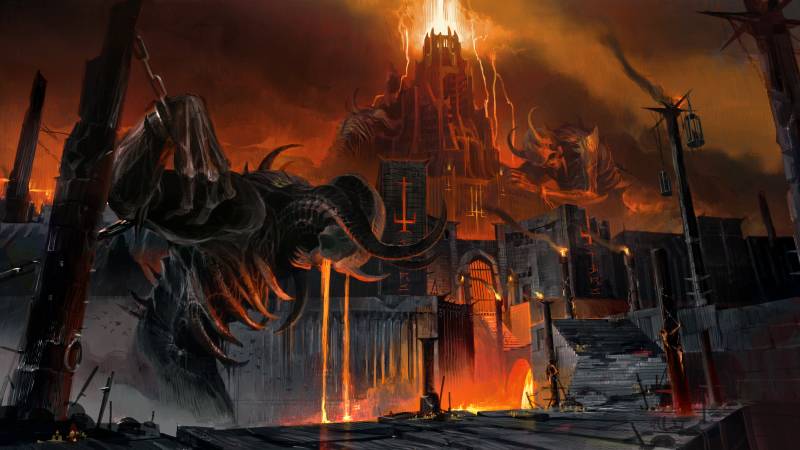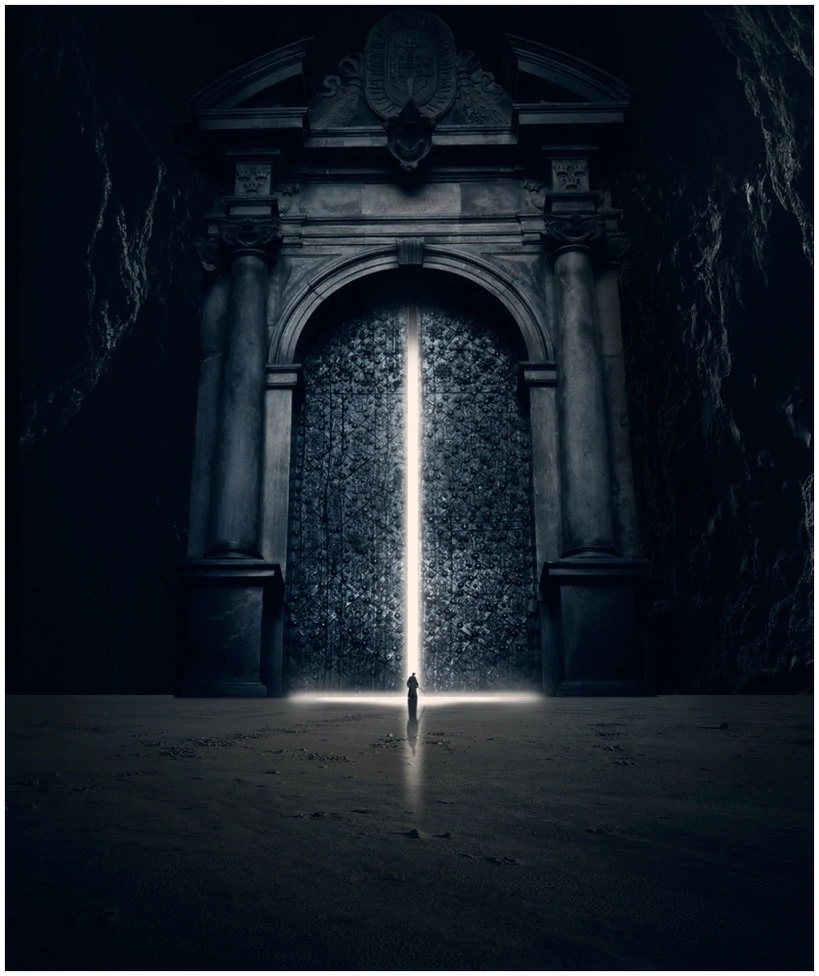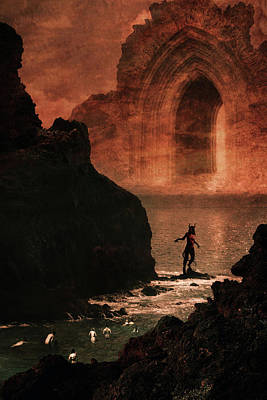《最后的诗歌》:31: 地狱之门
《最后的诗歌》
XXXI
第三十一首
地狱之门
Hell Gate
英国 A. E. 豪斯曼原著
Alfred Edward Housman (1859 – 1936)
徐家祯翻译

Onward led the road again
Through the sad uncoloured plain
Under twilight brooding dim,
And along the utmost rim
Wall and rampart risen to sight
Cast a shadow not of night,
And beyond them seemed to glow
Bonfires lighted long ago.
And my dark conductor broke
Silence at my side and spoke,
Saying, „You conjecture well:
Yonder is the gate of hell.”
Ill as yet the eye could see
The eternal masonry,
But beneath it on the dark
To and fro there stirred a spark.
And again the sombre guide
Knew my question, and replied:
„At hell gate the damned in turn
Pace for sentinel and burn.”
Dully at the leaden sky
Staring, and with idle eye
Measuring the listless plain,
I began to think again.
Many things I thought of then,
Battle, and the loves of men,
Cities entered, oceans crossed,
Knowledge gained and virtue lost,
Cureless folly done and said,
And the lovely way that 1ed
To the slimepit and the mire
And the everlasting fire.
And against a smoulder dun
And a dawn without a sun
Did the nearing bastion loom,
And across the gate of gloom
Still one saw the sentry go,
Trim and burning, to and fro,
One for women to admire
In his finery of fire.
Something, as I watched him pace,
Minded me of time and place,
Soldiers of another corps
And a sentry known before.
Ever darker hell on high
Reared its strength upon the sky,
And our footfall on the track
Fetched the daunting echo back.
But the soldier pacing still
The insuperable sill,
Nursing his tormented pride,
Turned his head to neither side,
Sunk into himself apart
And the hell-fire of his heart.
But against our entering in
From the drawbridge Death and Sin
Rose to render key and sword
To their father and their lord.
And the portress foul to see
Lifted up her eyes on me
Smiling, and I made reply:
„Met again, my lass,” said I.
Then the sentry turned his head,
Looked, and knew me, and was Ned.
Once he looked, and halted straight,
Set his back against the gate,
Caught his musket to his chin,
While the hive of hell within
Sent abroad a seething hum
As of towns whose king is come
Leading conquest home from far
And the captives of his war,
And the car of triumph waits,
And they open wide the gates.
But across the entry barred
Straddled the revolted guard,
Weaponed and accoutred well
From the arsenals of hell;
And beside him, sick and white,
Sin to left and Death to right
Turned a countenance of fear
On the flaming mutineer.
Over us the darkness bowed,
And the anger in the cloud
Clenched the lightning for the stroke;
But the traitor musket spoke.
And the hollowness of hell
Sounded as its master fell,
And the mourning echo rolled
Ruin through his kingdom old.
Tyranny and terror flown
Left a pair of friends alone,
And beneath the nether sky
All that stirred was he and I.
Silent, nothing found to say,
We began the backward way;
And the ebbing lustre died
From the soldier at my side,
As in all his spruce attire
Failed the everlasting fire.
Midmost of the homeward track
Once we listened and looked back;
But the city, dusk and mute,
Slept, and there was no pursuit.

道路继续往前延伸,
穿过一片平原凄惨而混蒙;
在苍茫的暮色下模糊昏暗,
沿着极目远望的地缘,
在眼前出现了城墙和堡垒,
投射出一片阴影而非夜之所为;
建筑物背后似乎有光亮闪耀,
那是很久以前点燃的篝火在燃烧。
我阴沉的向导走在我身边,
他打破沉默开口发言:
“你的猜测真的很神:
那边正是地狱之门。”
眼睛几乎无法看清,
这座永恒的石头大门,
可是在门下黑暗之中,
有一颗火星来回在动。
阴郁的向导再次知道我的问题,
于是开口为我解惑答疑:
“在地狱门口受罚的魂灵
要轮流被焚烧并到门口执勤。”
注视着铅色的苍天,
我只见模糊不清的一片,
倦怠的眼睛打量的大地无精打采,
我重新开始思考起来。
许多事情出现在我脑海,
战斗,以及人类之爱,
还有越过的海洋,到过的城廓,
获得的知识,失去的美德,
无法弥补的愚蠢言行,
以及高尚的应付世情,
都将我引到污坑和泥沼,
还被永恒的火焰焚烧。
在慢火焚烧的焦黑色灰堆上
出现了没有太阳的曙光,
城堡隐隐约约地临近,
穿过暮气沉沉的大门,
还能看见那来回走动的哨兵,
全身焚烧着,却穿着齐整,
这种火焰色彩的服装,
最会受到女人的欣赏。
当我看着他来回踱步的瞬间,
让我想起某个时间和地点,
另一个兵团的那些战士,
以及一个哨兵我以前认识。
地狱更为黑暗的阴影高高升起,
朝着天空释放它的气力;
我们走在路上的脚步声,
响起了让人震惊的回音。
可是那哨兵不动声色、举止自如,
在不可逾越的门槛之前踱步;
他正在培养被折磨拷打的自豪,
眼睛往前注视,头两边都不摇。
他专心致志只关注着自身,
地狱之火正在烧灼他的内心。
我们刚要跨过那座吊桥,
死神和罪孽站起来阻扰,
他们把宝剑和钥匙,
交给他们的的父亲和主子。
那个脏兮兮的女看守员,
抬起眼皮朝我看了一眼,
我微笑着跟她搭腔:
“又见面了,我的姑娘。”
那位哨兵转过头来看我,
认出了我,原来他是乃德。
他一看见我,就笔直地停伫,
用背脊把大门抵住,
举起毛瑟枪顶在下巴上,
地狱里就像蜂窝一样,
从里面传出热闹的嗡嗡之声,
犹如国王回到了家门,
从远方带回战利品,
还有一群俘虏的士兵,
凯旋的车辆正在等待,
他们把大门全都打开。
可是在栅栏挡住的进口,
叛逆的士兵叉开双腿防守,
他武器优良,弹药充足,
全来自地狱的兵库;
罪孽在他左边,死亡在他右边,
面色苍白,病容满脸,
对着反叛的火焰熊熊,
显出一副恐惧的面容。
在我们的头顶,黑暗低垂,
愤怒之情充塞着云堆,
屏住将要射出的闪电,
可是,叛兵的毛瑟枪发了言。
当地狱之主倒下的时候,
空荡荡的地狱发出了巨吼,
在他古老王国的废墟上,
翻滚着哀悼之声的回响,
暴政与恐惧逃之夭夭,
留下一对朋友不伤毫毛,
在冥界的天空之下,
还有生气的仅剩我与他。
无话可说,沉默无言,
我们开始往原路回返;
在我身边的士兵,
身上暗淡的光彩已经褪尽,
他那套华丽的服装,
也失去了永恒之火的华光。
在回家的半路上,
我们停下听了听,回头望了望,
只见城里薄暮冥冥,一片寂静,
就像已经入睡,后面也无追兵。
二0二二年六月六日
译于澳大利亚刻来佛寺爱闲堂
* 豪斯曼的这首诗是诗集《最后的诗歌》中的第 31 首。
这是一首叙事诗,是豪斯曼诗歌中最长的一首诗,共有 104 行。这首诗说的是 诗中的主人公被魔鬼(诗中说的是“阴郁的向导”)引导到地狱去的故事。故事很简单: 诗一开头就描写了地狱之外的景色和气氛,然后就到了地狱之门。门口有哨兵放哨, 那哨兵就是因为生前的罪孽而在受罚、并被地狱之火焚烧的灵魂。主人公在地狱门口 回想了自己的一生,他看见那放哨的士兵似乎是以前的熟人,但是那哨兵“专心致志只 关注自身”,所以并没注意到主人公的到来。这时,门旁的“死亡”和“罪孽”两个恶煞把 地狱之门的钥匙和宝剑交给那个向导,诗人说,那向导是“死亡”和“罪孽”的“父亲”和 “主子”,所以看来,他就是地狱的主人。这时,地狱门口的女看守员朝主人公看了一 眼,主人公就与她打了个招呼,称她为“我的姑娘”。此时,那哨兵才认出了主人公, 主人公也认出了那哨兵就是他以前的朋友,名叫乃德。乃德见到自己的朋友要进地狱,就开始反叛。他举起手中的毛瑟枪,开枪把地狱的主人打死了。于是地狱就变成了废 墟,随之而来的是 “暴政和恐惧逃之夭夭”,“只留下一对朋友不伤毫毛”。诗的最后说, 主人公与他的哨兵朋友离开了地狱之门,重回家乡。半路回头再望地狱,“只见城里薄 暮冥冥,一片静寂,就像已经入睡,后面也无追兵。”
那么通过这首诗,诗人想说什么意思呢?有的学者认为,诗人推翻了宗教中关 于地狱是惩罚有罪灵魂的永恒所在这一理念。诗人认为,地狱是可以被人推翻的。实 际上,诗人并不相信真正地狱的存在,诗人认为,地狱只存在自己的心中。在诗中, 主人公开口与那女看守员说话之前,每个人都只是关注自己:主人公观察地狱的外景, 回想他过去的一生,但并没有说话;哨兵“专心致志只关注自身”,连主人公的到来他 都没有看见。等到主人公一开口与女看守员说话,故事的转折点就到来了:哨兵和主 人公相互认出了自己的朋友,于是哨兵就开始造反,用“地狱兵库”中获取的武器和弹 药打死了地狱的主人,摧毁了地狱。所以,有的学者认为,诗人认为地狱存在于自身, 一旦人们开始了人际之间的交流,内心的地狱就能被摧毁。
也有学者结合豪斯曼的经历,认为这位哨兵和朋友就象征了豪斯曼的挚友杰克 森。诗人认为根据宗教的教义,作为同性恋者,他死后就会入地狱,但是杰克森能把 他救出地狱,重回人间。
我想,这首诗也可以说是想赞美朋友的伟大力量吧。即使到了地狱,朋友也可 以把人从中拯救出来。
反正,读者可以根据自己的理解解释这首诗歌的寓意。
全诗 104 句,分成长短不一的七节,每两句押一韵。译诗遵照原诗韵式押韵。
